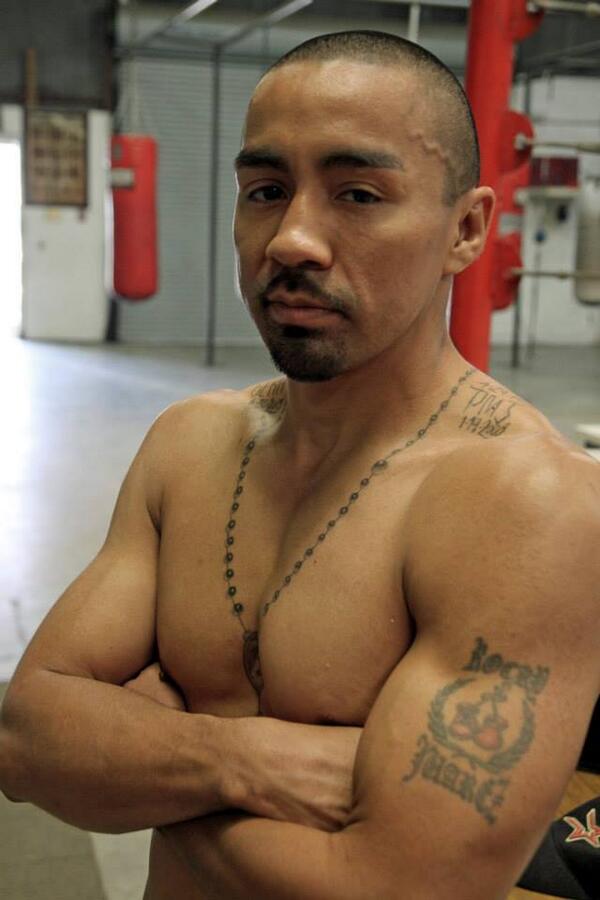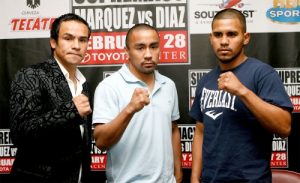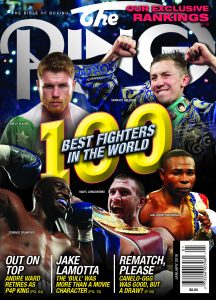Best I Faced: Rocky Juarez

Five-time world title challenger Rocky Juarez will go down as one of the finest fighters of his generation not to win a belt, but he was so much more than a nearly man.
Born Ricardo Juarez in Houston, Texas, on April 15, 1980, he was the youngest of six children and grew up in the tough North Central neighborhood in Houston.
His grandfather had been a boxer in Mexico and taught him the basics but, at that time, he just fought with his friends on the block and gravitated towards baseball.
“I never I felt I was better at boxing than baseball,” Juarez told RingTV.com. “I had put more years into baseball and I was doing pretty well. I had made the All Stars and won a few MVP’s. I preferred boxing because it was more of a one-on-one sport than baseball which is a team sport.”
Juarez went on to enjoy a stellar amateur career. He was selected to represent the USA at the 1997 World Championships and was the youngest member of the squad. Despite losing in the opening round, the experience helped prepare him for the same tournament two years later and this time it was hosted in his home city.
While still in school, Juarez went on to win gold in front of his friends and family in Houston.
“It was a very proud moment,” he said. “The assistant principal was a big fan of mine and filled two or three school buses and they came to the final.
“I remember warming up and looking at the crowd and seeing the colors of my school, the cheerleaders, the pompoms. It was great.”

Photo courtesy of Juarez’s Twitter account: @RockyJuarezBox
The following year, Juarez travelled to Sydney, Australia for the 2000 Olympics. He won his first four bouts en route to the final, procuring a 68-fight win streak.
In the final, however, Juarez lost to Bekzat Sattarkhanov, dropping a 22-14 decision. The Houston-native remains philosophical about that setback.
“I remember the fight very clearly,” Juarez said. “God had a plan. Some days you have good days, some days you have bad days.
“I lost that fight and I’m a big believer in faith. After I lost, I was questioning why. I worked so hard. I did everything I was supposed to do. Then came the day I received a call letting me know (Bekzat Sattarkhanov) passed away in a car accident that New Year’s Eve. I feel like (the victory) was his highlight because his time was coming.”
Juarez exited the amateur ranks with a record of 145-16 and turned professional on January 13, 2001 at the Mohegan Sun in Uncasville, CT. Highly-touted at the age of 20, Juarez won a four-round decision over Pascali Adorno on the undercard of Zab Judah’s IBF junior welterweight title defense against Reggie Green.
The young prospect’s career progressed nicely over the next couple of years. Juarez was able to gain experience facing savvy veterans like former 122-pound titleholder Hector Acero-Sanchez and mid-level fighters like Jason Pires and Frankie Archuleta.
In the summer of 2003, Juarez posted what was arguably a career-best performance to that point when he knocked out Antonio Diaz with a devastating left hook. It was THE RING’s “Knockout of the Year”.
At the end of 2003, Juarez was 19-0 and a popular local ticket seller. He had also won his first regional title and was heading toward world class level.
“I always knew I was going to fight guys more talented than I was.” acknowledged Juarez. “But I never believed there was a fighter who trained harder than me or wanted it more than me.”
After besting the awkward Zahir Raheem, Juarez blasted out former titleholder Guty Espades Jr. and Juan Carlos Ramirez. Those victories earned him a shot at WBC titleholder In Jin Chi in the summer of 2005.
Two weeks before the fight, however, the South Korean injured his Achilles tendon and had to pull out. At late notice, the little-known Humberto Soto stepped in to save the HBO “Boxing After Dark” telecast. The pair went back and forth over 12 torrid rounds and Soto managed to spring the upset.
“Soto, he was gonna shine,” Juarez said candidly. “He came out thinking, ‘I’ve been given a shot to fight on HBO’. He was in shape. He was due to fight a week after. He was already in training.
“I spoke with him after the fight. I congratulated him and we had a beer. He told me, ‘You were the hardest puncher I fought. I don’t know how I stood up to your shots. Every time you hurt me my reaction was to fight back.'”
Juarez’s first defeat was via close decision and it was a bitter pill to swallow. Two wins later, however, he was offered the opportunity to step up to junior lightweight and face the great Marco Antonio Barrera for the WBC belt.
 On May 20 at the Staples Center in Los Angeles, Juarez gave one of his idols a far tougher night than many expected. At the final bell, the scorecards were announced and the decision was a draw.
On May 20 at the Staples Center in Los Angeles, Juarez gave one of his idols a far tougher night than many expected. At the final bell, the scorecards were announced and the decision was a draw.
But bad news lay ahead.
“Backstage, 15-20 minutes after the fight they came back to dressing room and the commissioner of California said they had miscalculated the scorecards and that I had lost by one point,” recalled Juarez.
“All I thought in my mind was I just went 12 rounds with Barrera [Laughs]. It didn’t matter to me. I was just a young man who had the privilege to fight a legend.”
Four months later they met in a rematch. Barrera elected to play it safe on this occasion and used his superior boxing skills to win a much more comfortable decision.
When he headed for the airport to travel home, Juarez encountered an old Mexican gentleman who had attended the fight: “He came up to me and said in Spanish, ‘Rocky, I went to your fight. I came to see Barrera kick your ass. I thought the first fight was a fluke. There’s nothing to be ashamed of. Keep your head up. I’ve always been a big Barrera fan, but he lost my respect after this fight. I’ve never seen him fight like he fought you.’ He basically said Barrera ran the second fight.”
Juarez got back in line, won two fights and landed a third world title contest against another Mexican icon, Juan Manuel Marquez, in November 2007.
Disaster struck almost immediately when a clash of heads caused a cut over Juarez’s left eye in Round 1. The wound bled for the entire fight, hampering his vision and Marquez went on to claim a wide 12-round decision.
After a 10-month hiatus, Juarez returned in September 2008 against Jorge Barrios, as part of a HBO co-feature with Houston cohort Juan Diaz.
Although Juarez was marginally behind on two of the scorecards at the end of 10 rounds, he continued to press the action. In the 11th he dropped Barrios and a badly lacerated lip forced the referee to stop contest in Juarez’s favor.
The WBA featherweight titleholder, Chris John, was next, but Juarez just could not get over the finish line. In February 2008, they fought to a draw and seven months later John won a comfortable decision.
Including the John defeat, Juarez would lose six consecutive fights – one of them against the superb Jorge Linares. He had dropped from title challenger to fringe contender. Following a final defeat to Robinson Castellanos in January 2015, Juarez decided to bring the curtain down on a terrific 14-year professional career.
“In time you get over things,” Juarez said. “I just feel like I was able to compete against the best fighters out there. I know there was no champion I fought who was on their way out. Marquez was still winning big major fights. Barrera has always been high class. Linares was probably in his prime. Chris John was still undefeated.
“You can say I fought legends. I was privileged to be in the ring with these guys and they were in a fight. I was never an easy opponent. I’m happy with that.”
While Juarez (33-11-1, 21 knockouts) fought several top-drawer opponents, there were a few he wished he could have shared a ring with.

From left to right: Juan Manuel Marquez, Juarez and Juan Diaz. Photo by Tom Hogan
“I would have loved to have fought [Manny] Pacquiao,” he explained. “There was talks about fighting him. The late Johnny Tapia; that was talked about but never happened. Also, Juan Diaz and I, both of us from Houston. He was in a different weight. It didn’t happen but maybe it should have.”
Juarez, now 37, isn’t married but has a partner. They’ve been together for 10 years and have four children. Still based in Houston, the former five-time world title challenger owns Rocky’s Boxing Gym, the very first gym he first trained out of. He bought it earlier this year and hopes to give back to the community by keeping children off the streets. Juarez also owns four houses and uses them as an investment.
He graciously took time to speak to RingTV.com about the best he fought in 10 key categories.
BEST JAB
Jorge Linares: It would be between Linares and Barrera. Linares could throw two, three jabs at once. He had better movement than Barrera. He could throw the jab on a dime. Barrera’s jab was sneaky, a long jab. I was pretty good at knowing an opponent’s jab and Barrera just happened to have a longer reach than I expected. I’d have to say Linares. He had better speed with the jab. It was a range finder; a set up punch.
BEST DEFENSE
Linares: He just moved. He knew how to get out and get himself out of harm’s way. On the inside, he knew how to smother my shots and how to get out; knowing when to retreat at the perfect time.
FASTEST HANDS
Zahir Raheem: It would be between Zahir and Linares. That’s all (Raheem) had was his speed. Punching power wasn’t that effective. His jab was his strongest shot.
FASTEST FEET
Linares: He just knew how to keep distance. One of the reasons I’m picking Linares is because he’s probably the only guy that beat me where I knew I lost with no question. I just couldn’t catch him. I couldn’t find my distance. I just couldn’t land my shots flush like I wanted to.
BEST CHIN
Humberto Soto: That’s an easy one. It had to be Humberto Soto. Barrera, I caught clean and I knew he could feel (the punches). I’d have to say Soto. Mentally, he made me think. At the time, I was undefeated. Everybody I was hitting I was knocking out. I was very strong-willed and strong-minded. There was no way I thought I could lose. Soto kept coming, he had a good chin to the point I thought I broke my hand.
SMARTEST
Marco Antonio Barrera: That would have to be Barrera. In the second fight, he stayed with the game plan. He learned from the first fight and boxed. He stayed on the outside and didn’t engage.
STRONGEST
Andrew Cancio: He was a young fighter – strong, hungry. I was always the one accustomed to pushing my opponents back and Cancio surprised me. He had good punching power.
BEST PUNCHER
Jorge Barrios: There’s punching power where (the punches) are sharp, like [Juan Manuel] Marquez, and there’s guys who hit hard to where you block the shot and you can still feel the punch. Barrios was one guy where I could feel his shots when he landed, but he was very slow. Even though I knew to expect a punch, he hurt me in the fight. Marquez never hurt me.
BOXING SKILLS
Linares: I think Linares being a bit taller than (Barrera and Marquez). He could throw the double jab, he had good feet, he was an overall rounded fighter: good speed, good movement, good power. He dropped me in the fifth round.
BEST OVERALL
Barrera: That would have to be between Marquez and Barrera. Barrera retired before Marquez but Marquez accomplished more. There’s always an argument in that question. Marquez, he had pop, he was very accurate. Barrera, he was smart, he showed it in the second fight. I’m going to say Barrera.
ALSO ON RINGTV.COM: ROCKY JUAREZ RAISES MONEY FOR VICTIMS OF HURRICANE HARVEY
Questions and/or comments can be sent to Anson at [email protected] and you can follow him at www.twitter.com/AnsonWainwright
Struggling to locate a copy of THE RING Magazine? Try here or
Subscribe

You can order the current issue, which is on newsstands, or back issues from our subscribe page.
On the cover this month: THE RING 100














